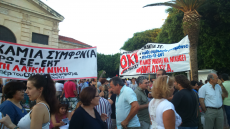
You might have noticed that Greece is all over the news at the moment. The Prime Minister of Greece, Alexis Tsipras, called for a referendum on the new bailout deal. This means that the people of Greece came out on the 5th July to vote “yes” or “no” to the offer from the EU to save Greece’s failing banks. A “bailout” isn’t a bailout of the people, but of the banking system. It sounds like something Greece sorely needs, but the price to pay for the money they’re offered is very heavy.
In order to accept the bailout, the Greek government would have agreed to another “austerity” measure. This means that the Greek government has to cut back massively on spending, and it can end up putting people out of work. Because these austerity measures are so harsh, it may have the impact of reducing the wages of ordinary working Greeks. In a time when everything is getting more and more expensive, this is simply unacceptable to many Greeks.
You might also be wondering what the term “Grexit” means. This is a new word that’s been floating around in the press recently, and it basically raises the possibility of Greece leaving the European Union. This referendum was definitely portrayed as a make-or-break time for Greece, but most Greeks want to stay in the EU. The question is whether it would actually be possible for them to stay in, without accepting the harsh terms of the bailout. Whew! Tricky stuff.
The news makes Syntagma (Constitution) Square in Athens look like a place for political violence. I was there just one week before the referendum, and although I might have been there when things were a little quieter, you would not have known you were in a place that was portrayed as a riotous hellhole abroad. Syntagma Square has the government building at the head of it, and unlike London’s regular protestors, there were no demonstrations outside it.
Even when I did come across a protest, it was on the island of Crete. Athens might not be a hugely popular holiday destination, but Crete certainly is, and thousands upon thousands of British and other northern European tourists go there every month. Other than the usual threats of pickpockets, there was no real reason for the people at home to worry, because the protests in Greece were not violent ones. The ones I saw (both for the “yes” and “no” campaigns) had somebody on a microphone, and a large gathering of people, but that was it. It was a warm summer evening, and most people at the protest were standing around talking to their friends, even if they did hold some sort of political sign.
Although this was quite a big moment in Greek politics, most Greeks I encountered seemed to think it wasn’t the end of the world. “It’s not a war” said one. For a country that has seen far more closely the horrors of war, both at home and on the Balkan Peninsula, this attitude is easy to understand. Life goes on, as it always has, for the people of Greece.
Image: Alice Barnes-Brown

0 Comment:
Be the first one to comment on this article.